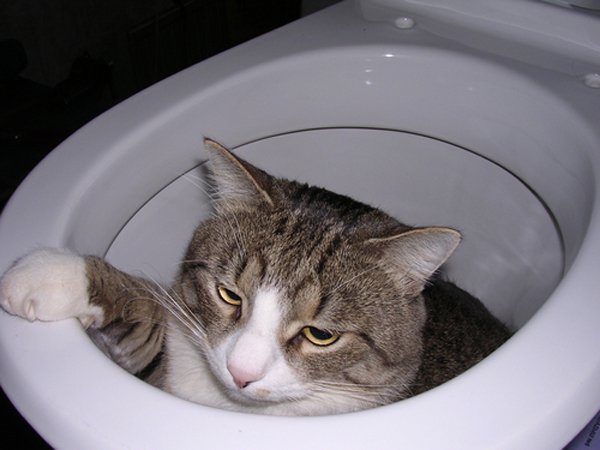Avoid Flush Cat Poop Down Your Toilet - Preserve Your House's Pipe Integrity
Avoid Flush Cat Poop Down Your Toilet - Preserve Your House's Pipe Integrity
Blog Article
Have you been trying to find advise concerning Don’t flush cat feces down the toilet?

Introduction
As feline proprietors, it's essential to be mindful of exactly how we deal with our feline friends' waste. While it may appear convenient to purge feline poop down the toilet, this technique can have detrimental repercussions for both the environment and human health.
Alternatives to Flushing
Thankfully, there are safer and much more responsible ways to dispose of cat poop. Take into consideration the following alternatives:
1. Scoop and Dispose in Trash
The most typical method of taking care of pet cat poop is to scoop it into a biodegradable bag and toss it in the garbage. Make certain to make use of a devoted litter inside story and dispose of the waste immediately.
2. Usage Biodegradable Litter
Go with eco-friendly pet cat litter made from materials such as corn or wheat. These litters are environmentally friendly and can be safely disposed of in the garbage.
3. Bury in the Yard
If you have a lawn, consider burying cat waste in a designated area away from veggie yards and water resources. Make certain to dig deep sufficient to avoid contamination of groundwater.
4. Install a Pet Waste Disposal System
Invest in a pet waste disposal system especially designed for pet cat waste. These systems make use of enzymes to break down the waste, lowering odor and environmental effect.
Health Risks
In addition to ecological problems, purging feline waste can also pose health threats to people. Pet cat feces might include Toxoplasma gondii, a bloodsucker that can cause toxoplasmosis-- a potentially serious illness, especially for expectant ladies and individuals with damaged immune systems.
Ecological Impact
Flushing cat poop presents harmful virus and parasites into the water, posing a substantial danger to water environments. These impurities can negatively influence marine life and compromise water high quality.
Conclusion
Liable pet dog ownership prolongs beyond offering food and sanctuary-- it likewise includes appropriate waste monitoring. By refraining from purging feline poop down the commode and opting for alternative disposal techniques, we can lessen our environmental impact and secure human health.
Why Can’t I Flush Cat Poop?
It Spreads a Parasite
Cats are frequently infected with a parasite called toxoplasma gondii. The parasite causes an infection called toxoplasmosis. It is usually harmless to cats. The parasite only uses cat poop as a host for its eggs. Otherwise, the cat’s immune system usually keeps the infection at low enough levels to maintain its own health. But it does not stop the develop of eggs. These eggs are tiny and surprisingly tough. They may survive for a year before they begin to grow. But that’s the problem.
Our wastewater system is not designed to deal with toxoplasmosis eggs. Instead, most eggs will flush from your toilet into sewers and wastewater management plants. After the sewage is treated for many other harmful things in it, it is typically released into local rivers, lakes, or oceans. Here, the toxoplasmosis eggs can find new hosts, including starfish, crabs, otters, and many other wildlife. For many, this is a significant risk to their health. Toxoplasmosis can also end up infecting water sources that are important for agriculture, which means our deer, pigs, and sheep can get infected too.
Is There Risk to Humans?
There can be a risk to human life from flushing cat poop down the toilet. If you do so, the parasites from your cat’s poop can end up in shellfish, game animals, or livestock. If this meat is then served raw or undercooked, the people who eat it can get sick.
In fact, according to the CDC, 40 million people in the United States are infected with toxoplasma gondii. They get it from exposure to infected seafood, or from some kind of cat poop contamination, like drinking from a stream that is contaminated or touching anything that has come into contact with cat poop. That includes just cleaning a cat litter box.
Most people who get infected with these parasites will not develop any symptoms. However, for pregnant women or for those with compromised immune systems, the parasite can cause severe health problems.
How to Handle Cat Poop
The best way to handle cat poop is actually to clean the box more often. The eggs that the parasite sheds will not become active until one to five days after the cat poops. That means that if you clean daily, you’re much less likely to come into direct contact with infectious eggs.
That said, always dispose of cat poop in the garbage and not down the toilet. Wash your hands before and after you clean the litter box, and bring the bag of poop right outside to your garbage bins.
https://trenchlesssolutionsusa.com/why-cant-i-flush-cat-poop/

We had been shown that write-up about How to Dispose of Cat Poop and Litter Without Plastic Bags from an acquaintance on our other site. Are you aware of somebody else who is involved in Don’t flush cat feces down the toilet? Do not hesitate to promote it. I value reading our article about Can You Flush Cat Poop Down The Toilet?.
Schedule Service Report this page